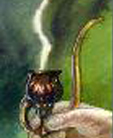Of Aulë and Yavanna

The Creation of the Dwarves
– Aulë so greatly desired to have people to whom he could teach his crafts and his lore that he became unwilling to wait for the coming of the Elves and Men. So, in the in a hall under the mountains of Middle-earth, he created the Seven Fathers of the Dwarves.
– When Aulë was about to teach the dwarves to speak, Ilúvatar spoke to him, asking Aulë why he had made these beings – a task beyond his authority and power. Aulë replied that he didn’t seek power or lordship, simply beings to love and teach about the beauty of Eä. He took up a hammer to smite the Dwarves he had made, and they shrank away from the hammer, begging for mercy.
– But Ilúvatar would not allow Aulë to strike the dwarves, saying that they already had a life of their own, and he accepted the dwarves as being a part of the plan for Arda. But he would not let them be born before his own children, and Aulë set them to sleep in the darkness under stone until after the coming of the Elves.
– Since they were to come in the days of the power of Melkor, Aulë made them strong to endure, stubborn, hardy, and fast in both friendship and enmity. They would suffer hurt of body and hunger more hardily than the Children of Ilúvatar, and they would live far longer than Men, though not forever.
– The dwarves believe they after their deaths, Aulë (whom they call Mahal) gathers them to a set of halls in Mandos. Their final role will be to aid Aulë in the Last Battle and to aid him in the remaking of Arda afterwards.
Yavanna, Manwë and the Ents
– After Ilúvatar had spared the Dwarves, Aulë told Yavanna of his works and what had come to pass.

– Because he hadn’t truly opened his heart to her from the beginning, she decreed that the Dwarves would have little things for the things of Yavanna. She said that the Dwarves would first love things that they made, and would delve in the earth, not heeding the things that grow and live upon the earth.
– Aulë replied that the Children of Ilúvatar would do the same thing, and then Yavanna went to Manwë, not betraying Aulë’s confidences but instead asking whether the Children of Ilúvatar would indeed have dominion over the things of her labour.
– When Manwë told her that it was indeed so, she became concerned for her works. Manwë then asked her which of her works she held dearest, and Yavanna told him that the trees were special to her, and that she wished the trees could speak on behalf of all those things with roots, and could punish those that wrong them.
– While Manwë said that that was a strange thought, Yavanna told him that it was contained in the Music, for she had imagined great trees raising their voices up in song to Ilúvatar.
– Manwë sat in silence, and the thoughts of Yavanna grew within him, and were beheld by Ilúvatar. Then it seemed to Manwë as if again the Music rose up around him, and he came to see many things that had not been heeded before, and he came to see and comprehend many things that the other Ainur had contributed to the Music, but which had previously been hidden from him.
– When he came out from his vision, he told Yavanna that Ilúvatar had heard all the voices of the Ainur during their song, and that when the Children awoke, spirits would be summoned from afar and they would go among the animals (kelvar) and plants (olvar). Some would even dwell within them, and would be held in reverence and their anger will be feared. In the forests would walk the Shepherds of the Trees.
– Manwë also told Yavanna of the Eagles, that they would awake before the Children and that they would live in the mountains and hear the voices of those who would call on the Valar for aid.









